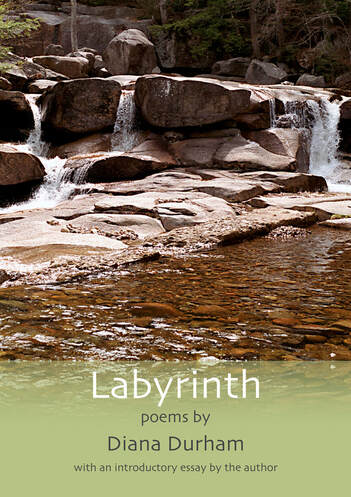Labyrinth, Diana Durham’s new poetry collection, is a search for connection, a search for finding a way into a new land. The roots of belonging, the familiar markers of entry are no longer there. Walking the path of the labyrinth - a metaphor for the collection - becomes a way of finding the physical and spiritual centre where the epiphany of connection can take place. In her introductory essay Diana Durham writes about the circumstances in which these poems came to be written when she moved from England to New Hampshire in America, where she was to live for over twenty years. Anyone who has been uprooted and transplanted from their own homeland can relate to the feelings of alienation which echo through many of the poems.
Apart from providing the background for the writing of the poems, the introduction also provides a description of Durham’s poetic process, a process that is individual to each and every poet, and in this case gives an interesting insight into how Durham approaches her craft.
Many of the poems in the collection come under the title of what I would call densely descriptive prose poetry, a genre which has been very popular among contemporary poets. It is well executed, its language meticulously crafted, and portrays the many landscapes of America as experienced by the poet. The urban blight of interstate highways and modern soulless towns is a constant leitmotif as the poet tries to reach beyond these to a deeper connection with the land they disfigure. “Mock Nothing” is a good example of a commentary on the ugliness of urban spaces and urban life with its sham emptiness. “Planet America” is another poem that speaks to attempts to fit into a foreign culture and land, find a way into the labyrinth and discover the transcendence at the centre. A poem such as “Lonely Climb Away from What We Love” captures something of the brittle hardness and anonymity of New York.
Yet the writing is punctuated with a continued quest for these outer layers to be stripped away and become transparent, for the veils between the worlds to thin so that they can open gateways onto a deeper reality, as in “Advent”:
the vanishing layers
of matter and thought
become like tissue,
like lace lights threaded through the tree
light on light - interstices gateways, advent.
“Philosopher’s Stone” depicts yet another such reaching towards the transcendent, “the thing itself, / shining / into the prism world”.
“At the Surface” contains more explicit personal emotion than many of the poems (“I remember this, this is the backward / plunge, the vertigo drop / the full glittering cascade / of reasons why there is no hope”), leading to a realization that the sought after transformation could come not through rage and struggle but through a “silent and fragile” power.
Many of the poems are strongly descriptive presenting pictures for the brain to conjure up. “Icing” and “The Snows of March” are examples of successful nature studies and word paintings. “San Diego Ladies” is a refreshing vignette, a nicely wrought image of the ladies who “talk in long, slow / sentences / like smoke from a slim, white / cigarette”. “At the Women’s Retreat” touchingly portrays a woman as “a soft half-statue / shined by water / her face / framed by the grey / brown curves of her hair / beautiful / in the light.” “Black River” is another particularly successful word painting.
“Gold” is one of the best poems in the collection with its interplay between gold - radiance - temple walls - facets - and space itself as a temple. The density of imagery really works here in evoking an inner landscape of the soul.
“Soft Scalpel” is another poem that stands out, offering a possible key to the collection in its concluding stanza:
This soft speaking
constellates geometries,
opens doorways into places
we have always known existed
yet, when our hearts needed so much filling,
could not find.
The poet wanders through this labyrinth, seeking to “speak simply” (in “Clear Through to the Sun”), looking often, finding but rarely.
“Temple” is another standout for me, also for the musicality of its concluding lines which are a gem combining meaning and form:
remember when this temple gets defaced
our bodies are the fractals of its grace.
In the introduction the poet writes of how she finally came to heal her homesickness and alienation and find the transcendent connection she sought with the new land, as expressed in the poem “Labyrinth”. Yet it is the second poem in the “Labyrinth” sequence, which for me clearly evokes Glastonbury Tor, that speaks most strongly of the epiphanies generated by a connection to the spirit of place. There is a strong sense of the constant pull of the Old World, a deeper pull which grows no less.
For those who like finely crafted and densely packed descriptive poetry which reaches towards transcendent meaning this is a good collection to savour and unpack.
Irina Kuzminsky (DPhil, Oxon).
This review was first published on Amethyst Review.

 RSS Feed
RSS Feed